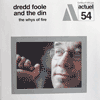Dredd Foole and the Din, "The Whys of Fire"
Ecstatic Yod
 A strange album that, try as I may, I can't help but like. It's theposturing evident on the packaging that's off-putting, borrowed cachetfrom old-fashioned fine art records (that's just sooo SYR) and oldschool improv. I guess that stuff works to an extent and you can'tblame folk for wanting to sell their disks. The music, on the otherhand, is handily distinct and functional. At heart its live recordingof a psychedelic group improvisation blow-out: three guitars (ThurstonMoore, Patrick Best and Jack Rose) plus Indian strings (Mike Gangloff)build a great big flat wall of atonal drone, skitter and feedbackagainst which Chris Corsano drums up a furious pounding storm andthrough which Foole's (Dan Ireton) heavily echoed and reverberatedvocal droning, shouting, and wailing tunelessly wanders. It's basicallyall noise played at a fairly static level with some embellishment.There's an impression of rather little interaction between theimprovisers for much of the way but that's looking at this the wrongway, as thought it were old-school improv (e.g. Company or AMM). Incontrast to that, what's really happening is what talented psychrockers do (did) in their long out-chorus extemporizations—the buildingup of one great big collective head-banging drone made up of as manycomponents as the band can muster. No one is trying to stand out frontin the sense of soloing or being a virtuoso and there's none of thechallenge-response approach—it's all collective action. What makes itstrange is the mix. You would be forgiven for not noticing Corsano'sdrumming, he's so low in the mix. Once you cotton on to thatcontribution the whole thing takes on a whole different aspect, turningfrom a nice little noise package into a dynamic driving rock-out.Foole's singing is primitive, musically-challenged but fairlyeffective. On most tracks he's just providing another element of thecollective din, adding color and a little humanity to the guitar ladenwhole. Emotionally powerful or aesthetically challenging he is not butthe heavy use of reverb etc. on his free-form vocalization brings anice 60s art experiment touch. I have a sense that the music isn'ttaking itself too seriously and that's also the key to enjoying it: agreat big indulgent degenerate-rock blow-out. How this release relatesto the two from the mid-80s when Ireton was collaborating with Missionof Burma alumni, I can't say, not having heard those. -
A strange album that, try as I may, I can't help but like. It's theposturing evident on the packaging that's off-putting, borrowed cachetfrom old-fashioned fine art records (that's just sooo SYR) and oldschool improv. I guess that stuff works to an extent and you can'tblame folk for wanting to sell their disks. The music, on the otherhand, is handily distinct and functional. At heart its live recordingof a psychedelic group improvisation blow-out: three guitars (ThurstonMoore, Patrick Best and Jack Rose) plus Indian strings (Mike Gangloff)build a great big flat wall of atonal drone, skitter and feedbackagainst which Chris Corsano drums up a furious pounding storm andthrough which Foole's (Dan Ireton) heavily echoed and reverberatedvocal droning, shouting, and wailing tunelessly wanders. It's basicallyall noise played at a fairly static level with some embellishment.There's an impression of rather little interaction between theimprovisers for much of the way but that's looking at this the wrongway, as thought it were old-school improv (e.g. Company or AMM). Incontrast to that, what's really happening is what talented psychrockers do (did) in their long out-chorus extemporizations—the buildingup of one great big collective head-banging drone made up of as manycomponents as the band can muster. No one is trying to stand out frontin the sense of soloing or being a virtuoso and there's none of thechallenge-response approach—it's all collective action. What makes itstrange is the mix. You would be forgiven for not noticing Corsano'sdrumming, he's so low in the mix. Once you cotton on to thatcontribution the whole thing takes on a whole different aspect, turningfrom a nice little noise package into a dynamic driving rock-out.Foole's singing is primitive, musically-challenged but fairlyeffective. On most tracks he's just providing another element of thecollective din, adding color and a little humanity to the guitar ladenwhole. Emotionally powerful or aesthetically challenging he is not butthe heavy use of reverb etc. on his free-form vocalization brings anice 60s art experiment touch. I have a sense that the music isn'ttaking itself too seriously and that's also the key to enjoying it: agreat big indulgent degenerate-rock blow-out. How this release relatesto the two from the mid-80s when Ireton was collaborating with Missionof Burma alumni, I can't say, not having heard those. -
 A strange album that, try as I may, I can't help but like. It's theposturing evident on the packaging that's off-putting, borrowed cachetfrom old-fashioned fine art records (that's just sooo SYR) and oldschool improv. I guess that stuff works to an extent and you can'tblame folk for wanting to sell their disks. The music, on the otherhand, is handily distinct and functional. At heart its live recordingof a psychedelic group improvisation blow-out: three guitars (ThurstonMoore, Patrick Best and Jack Rose) plus Indian strings (Mike Gangloff)build a great big flat wall of atonal drone, skitter and feedbackagainst which Chris Corsano drums up a furious pounding storm andthrough which Foole's (Dan Ireton) heavily echoed and reverberatedvocal droning, shouting, and wailing tunelessly wanders. It's basicallyall noise played at a fairly static level with some embellishment.There's an impression of rather little interaction between theimprovisers for much of the way but that's looking at this the wrongway, as thought it were old-school improv (e.g. Company or AMM). Incontrast to that, what's really happening is what talented psychrockers do (did) in their long out-chorus extemporizations—the buildingup of one great big collective head-banging drone made up of as manycomponents as the band can muster. No one is trying to stand out frontin the sense of soloing or being a virtuoso and there's none of thechallenge-response approach—it's all collective action. What makes itstrange is the mix. You would be forgiven for not noticing Corsano'sdrumming, he's so low in the mix. Once you cotton on to thatcontribution the whole thing takes on a whole different aspect, turningfrom a nice little noise package into a dynamic driving rock-out.Foole's singing is primitive, musically-challenged but fairlyeffective. On most tracks he's just providing another element of thecollective din, adding color and a little humanity to the guitar ladenwhole. Emotionally powerful or aesthetically challenging he is not butthe heavy use of reverb etc. on his free-form vocalization brings anice 60s art experiment touch. I have a sense that the music isn'ttaking itself too seriously and that's also the key to enjoying it: agreat big indulgent degenerate-rock blow-out. How this release relatesto the two from the mid-80s when Ireton was collaborating with Missionof Burma alumni, I can't say, not having heard those. -
A strange album that, try as I may, I can't help but like. It's theposturing evident on the packaging that's off-putting, borrowed cachetfrom old-fashioned fine art records (that's just sooo SYR) and oldschool improv. I guess that stuff works to an extent and you can'tblame folk for wanting to sell their disks. The music, on the otherhand, is handily distinct and functional. At heart its live recordingof a psychedelic group improvisation blow-out: three guitars (ThurstonMoore, Patrick Best and Jack Rose) plus Indian strings (Mike Gangloff)build a great big flat wall of atonal drone, skitter and feedbackagainst which Chris Corsano drums up a furious pounding storm andthrough which Foole's (Dan Ireton) heavily echoed and reverberatedvocal droning, shouting, and wailing tunelessly wanders. It's basicallyall noise played at a fairly static level with some embellishment.There's an impression of rather little interaction between theimprovisers for much of the way but that's looking at this the wrongway, as thought it were old-school improv (e.g. Company or AMM). Incontrast to that, what's really happening is what talented psychrockers do (did) in their long out-chorus extemporizations—the buildingup of one great big collective head-banging drone made up of as manycomponents as the band can muster. No one is trying to stand out frontin the sense of soloing or being a virtuoso and there's none of thechallenge-response approach—it's all collective action. What makes itstrange is the mix. You would be forgiven for not noticing Corsano'sdrumming, he's so low in the mix. Once you cotton on to thatcontribution the whole thing takes on a whole different aspect, turningfrom a nice little noise package into a dynamic driving rock-out.Foole's singing is primitive, musically-challenged but fairlyeffective. On most tracks he's just providing another element of thecollective din, adding color and a little humanity to the guitar ladenwhole. Emotionally powerful or aesthetically challenging he is not butthe heavy use of reverb etc. on his free-form vocalization brings anice 60s art experiment touch. I have a sense that the music isn'ttaking itself too seriously and that's also the key to enjoying it: agreat big indulgent degenerate-rock blow-out. How this release relatesto the two from the mid-80s when Ireton was collaborating with Missionof Burma alumni, I can't say, not having heard those. -



